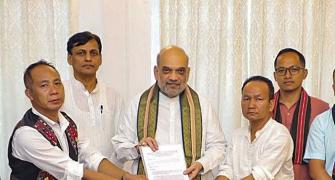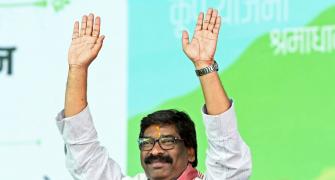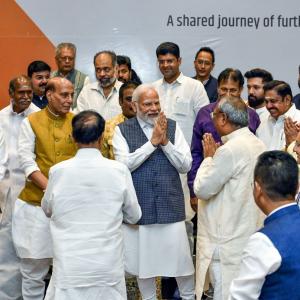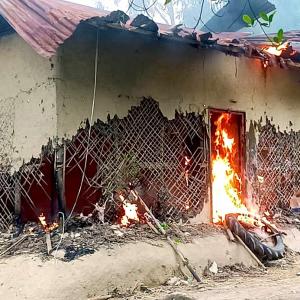'If the business before the House is suspended under Rule 267 it will mean the government has recognised that there is great urgency (to discuss the Manipur violence).'
'Government doesn't want to recognise that at all.'

Constitutional expert and former secretary general of the Lok Sabha P D T Achary explains the main difference between Rule 176, under which the Narendra D Modi government wants to discuss the ethnic violence in Manipur, and Rule 267, under which the Opposition wants to do it.
"Rule 267 by itself is not going to help them (the Opposition) because you can't raise a discussion under that," Achary tells Prasanna D Zore/Rediff.com.
What is the main difference between Rule 176 and Rule 267? Why is the Opposition pressing for a discussion on Manipur under Rule 267 and the Treasury benches pressing for a discussion under Rule 176?
Rule 176 is for a short duration discussion which should not last for more than two-and-a-half hours. Such short duration discussions are on very ordinary matters.
Then there is no voting allowed when a matter is discussed under Rule 176 and there can be no motion on the issue. So it's just a discussion (under Rule 176).
Under Rule 176, somebody (some Opposition MP) will initiate the discussion, the minister, whoever minister is in charge of it, will reply and the matter will be over.
Rule 267 is a motion called for suspension of the business of the day. That is the purpose of that (267) Rule. But Rajya Sabha (from the Opposition) members should also move a motion along with that; only then it makes sense.
Otherwise, Rule 267 by itself is not going to help them (the Opposition) because you can't raise a discussion under that.
That Rule (267) is only meant for suspending the business before the House. That is it. Now, after suspension what? Suspension is not enough.
Once the business before the House is suspended you have to move a motion to raise a discussion and that motion can be initiated under Rule 167.
Under this Rule (167) the mover of the motion, after calling for it, speaks on that motion. Then the others will speak and there will be a debate. At the end of the debate, the minister will reply. After the minister's reply, the mover will again reply to the motion.
Under Rule 167, the last say belongs to the mover of the motion.
Let it be reiterated that Rule 267 just calls for the suspension of the business before the House to discuss an urgent matter. After that the Opposition must move a motion to raise a discussion (under Rule 167).
Without that, what is the point of suspending the business before the House?
What disadvantage would the government have if Rule 267 is called in first and then a debate follows under Rule 167?
If the business before the House is suspended under Rule 267, it will mean the government has recognised that there is great urgency (to discuss the Manipur violence). Government doesn't want to recognise that at all.
Secondly, if there is a motion, there is voting and although the government is comfortably placed as far as the numbers are concerned. But government doesn't want a vote on this issue; putting the violence in Manipur to vote would be very uncomfortable for the government.
People (the MPs belonging to the ruling party) might vote differently on that (on the vote on Manipur violence).
Would you think the government would fear that somebody from their ranks would also vote against the government?
Such a fear may be there. That is why generally they (the Modi government) are against any kind of voting. They want to make it as innocuous as possible, as bland as possible.
Just a discussion and the matter is over.










